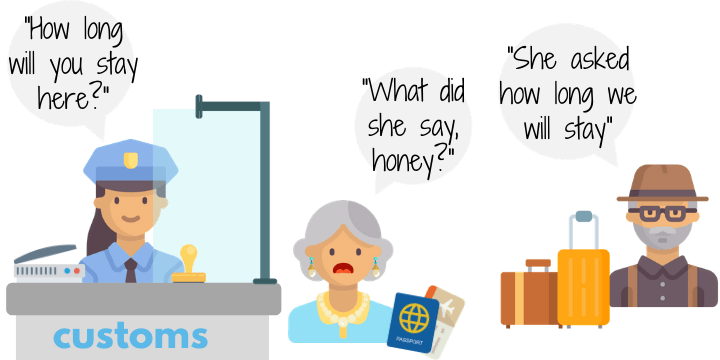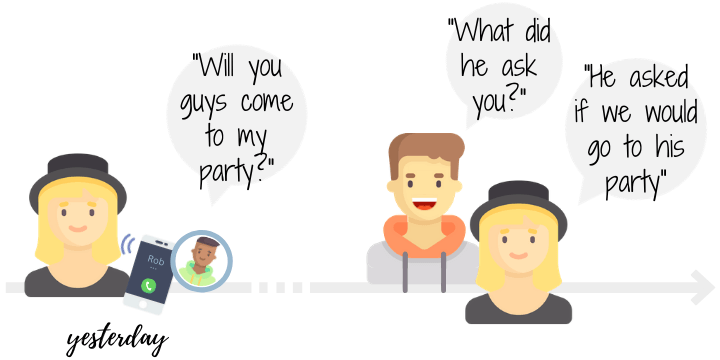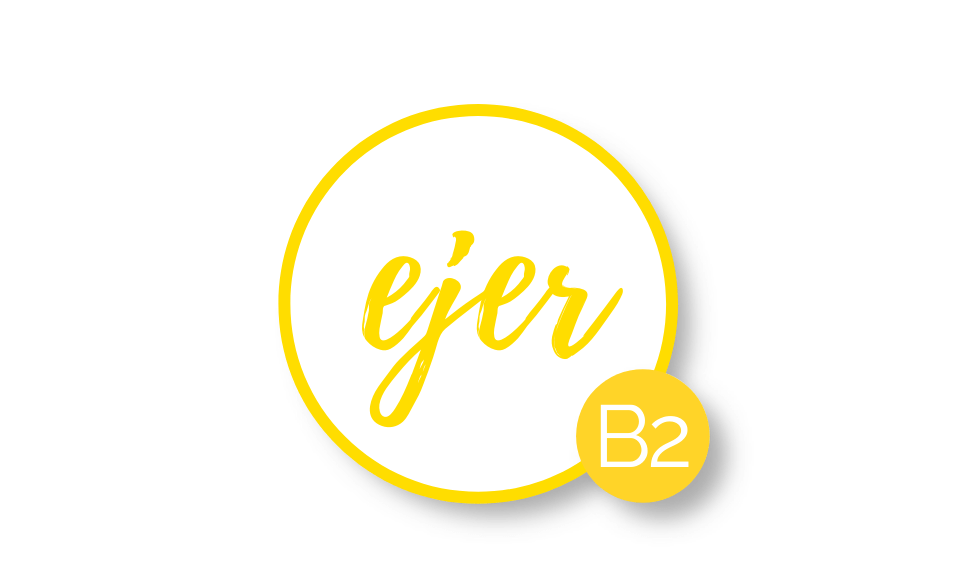Hacer el reported speech de preguntas en inglés es un poco peculiar, pero no es nada difícil para un hispanohablantes porque nosotros lo hacemos igual.
Partimos de la base de que para hacer el reported speech de la interrogativa se siguen las reglas normales del reported speech.
ir un paso atrás en el tiempo.
cambiar los complementos de tiempo, los posesivos y los demostrativos.
| He said, ‘I am playing with this’ | He said he was playing with that |
| He said, ‘I played yesterday’ | He said he had played the day before |
| He said, ‘I will play tomorrow’ | He said he would play the following day |
Además, se deben hacer otros dos cambios exclusivos del reported speech de preguntas. Vamos a ver esos cambios necesarios.
1 cambiar la estructura
Hay que pasar de la estructura de interrogativa de verbo + sujeto a la estructura de afirmativa de sujeto + verbo.
| directo | indirecto |
| He asked, ‘What are you doing?’ | He asked what I was doing |
| Él preguntó: “¿Qué estás haciendo?” | Él preguntó qué estaba haciendo yo |
| He asked, ‘Do you like it?’ | He asked if I liked it |
| Él preguntó: “¿Te gusta?” | Él preguntó si me gustaba |
Ten en cuenta, como hemos visto en los ejemplos, que no se hace igual el reported speech si hay una partícula interrogativa como what, when, where, why… que si no la hay. No hay mucho problema, porque en español lo hacemos exactamente igual. Si traduces, lo harás bien.
si hay partícula interrogativa

Si hay una partícula interrogativa, se debe pasar al hacer el reported speech. Como se usa para unir ambas frases, en realidad pasa como pronombre relativo.
| directo | indirecto |
| He asked, ‘When did you arrive?’ | He asked when I had arrived |
| Él preguntó: “¿Cuándo llegaste?” | Él preguntó cuándo había llegado yo |
| He asked, ‘Why did you do that?’ | He asked why I had done that |
| Él preguntó: “¿Por qué hiciste eso?” | Él preguntó por qué había yo hecho eso |
| He asked, ‘Where will you stay?’ | He asked me where I would stay |
| Él preguntó: “¿Dónde dormirás?” | Él me preguntó dónde dormiría yo |
| He asked, ‘Who is calling?’ | He asked who was calling |
| Él preguntó: “¿Quién llama?” | Él preguntó quién estaba llamando |
| He asked, ‘Where is the gym?’ | He asked where the gym was |
| Él preguntó: “¿Dónde está el gimnasio?” | Él preguntó dónde estaba el gimnasio |
Como hemos visto, en realidad esa partícula interrogativa pasa como un pronombre relativo que une las frases. Nuevamente, no hay problema porque son las mismas palabras en inglés y también en español.
si NO hay partícula interrogativa

Si no hay partícula interrogativa, se usa if para unir ambas frases, como hacemos en español, que las unimos con nuestro si.
| directo | indirecto |
| He asked, ‘Will you come?’ | He asked if I would come |
| Él preguntó: “¿Vendrás?” | Él preguntó si iba a venir |
| He asked, ‘Can you wait here?’ | He asked me if I could wait there |
| Él preguntó: “¿Puedes esperar aquí?” | Él me preguntó si podía esperar allí |
| He asked, ‘Did you call her?’ | He asked me if I had called her |
| Él preguntó: “¿La llamaste?” | Él me preguntó si la había llamado |
En español solo usamos if, pero en inglés también se puede usar whether cuando hay una idea de elección, es decir, cuando hay dos alternativas.
| directo | indirecto |
| He asked, ‘Would you like tea or coffee?’ | He asked whether I wanted tea or coffee |
| Él preguntó: “¿Quieres té o café?” | Él preguntó si quería té o café |
| He asked, ‘Will you come?’ | He asked whether I would come (or not) |
| Él preguntó: “¿Vendrás?” | Él preguntó si iba a venir |
| He asked, ‘Is it OK?’ | He asked me whether it was OK (or not) |
| Él preguntó: “¿Está bien?” | Él me preguntó si estaba bien |
| He asked, ‘Did you call her?’ | He asked me whether I had called her |
| Él preguntó: “¿La llamaste?” | Él me preguntó si la había llamado |
2 cambiar el reporting verb
El reporting verb o verbo introductorio tiene que cambiarse por alguno que signifique preguntar. Podemos usar varios verbos en inglés que expresan preguntar y, en el everyday English, lo normal es usar ask.
Sin embargo, en los 🎓 exámenes, el reported speech en preguntas suele caer en las transformations y específicamente están buscando que sepas las diferencias entre estos verbos.
| ask | preguntar |
| inquire / enquire | preguntar, indagar |
| wonder | preguntarse |
| want to know | querer saber |
Ask es el más normal. Además, es el único que nos permite ponerle una persona detrás.
| directo | indirecto |
| He said, ‘Do you like it?’ | He asked me if I liked it |
| Él preguntó: “¿Te gusta?” | Él me preguntó si me gustaba |
| He said, ‘What are you doing, Mary?’ | He asked Mary what I was doing |
| Él preguntó: “¿Qué estás haciendo, Mary?” | Él preguntó a Mary qué estaba haciendo |
Inquire / Enquire también significa preguntar pero con el sentido de indagar, investigar. Es más formal que ask.
| directo | indirecto |
| The Police said, ‘Where were you last night?’ | The Police inquired where I had been the night before |
| La Policía dijo: “¿Dónde estuviste anoche?” | La Policía preguntó dónde había estado la noche anterior |
Wonder tiene el sentido del español de preguntarse uno mismo, no de preguntarle a alguien.
| directo | indirecto |
| She said, ‘What should I do?’ | She wondered what she should do |
| Ella dijo: “¿Qué debería hacer?” | Ella se preguntó que debería hacer |
| She said, ‘What should I do?’ | She wondered what to do |
| Ella dijo: “¿Qué debería hacer?” | Ella se preguntó qué hacer |
| He said, ‘Shall I go now?’ | He wondered whether to go then |
| Él se preguntó: “¿Voy ahora?” | Él se preguntó si ir entonces |
Want to know es simplemente una alternativa a ask o inquire.
| directo | indirecto |
| He said, ‘What are you doing?’ | He wanted to know what I was doing |
| Él preguntó: “¿Qué estás haciendo?” | Él quiso saber qué estaba haciendo yo |
| He said, ‘Do you like it?’ | He wanted to know if I liked it |
| Él preguntó: “¿Te gusta?” | Él quiso saber si me gustó |
ejercicios
- todos
- transformar

